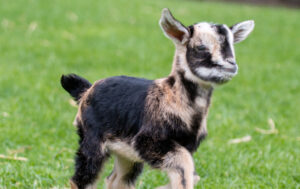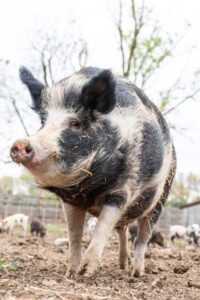Editor’s Note: Conner Prairie is a living history museum in Fishers, Indiana (near Indianapolis) which recreates 19th century life. Stephanie Buchanan, Director of Ag Initiatives for Conner Prairie, shares the museum’s reasons and approaches to working with livestock Conservation Priority List breeds including Tunis sheep, Arapawa goats, American rabbits, Ossabaw hogs and Randall cattle.
Conner Prairie plays a unique role in the world of heritage breed conservation. We are fortunate to serve both as a place where guests can explore the importance of heritage breeds and as a working farm committed to ensuring the survival of these endangered animals. Using Conner Prairie’s mission to inspire curiosity and foster learning for everyone as our guide, the Agriculture Department has two main goals: educate and preserve.
working farm committed to ensuring the survival of these endangered animals. Using Conner Prairie’s mission to inspire curiosity and foster learning for everyone as our guide, the Agriculture Department has two main goals: educate and preserve.
Education:
Agriculture affects everyone. The unfortunate reality is there is a disconnect between the general public and the animals that produce much of their food and fiber. Even fewer understand not all farm animals are the same or that these animals hold genetic value critical to preserve for the future. Fortunately, Conner Prairie is uniquely able to help bridge this gap. Animals are a natural draw for our guests – few people can resist the sight of an Arapawa goat kid bouncing through the pasture – and they help start conversations. Our heritage breed animals serve as ambassadors, inspiring curiosity about agriculture as a whole and teaching our guests about the importance of these animals, both in the past and for the future. Our livestock also bring our 19th century village to life, highlighting how early settlers depended on livestock for survival. Since some of the breeds that would have been raised in 19th century Indiana are extinct, we rely on the documentation we have containing descriptions of the animals that were here to select closely matching breeds, meaning our herds provide a glimpse into the past.
 Preservation:
Preservation:
In addition to providing our guests with unique, individualized experiences with our heritage breeds, we are also committed to doing our part to make sure these breeds survive and thrive. On our working farm, we have breeding herds of five heritage breeds, carefully managed to ensure adherence to breed standard and strategically bred (through artificial insemination, embryo transfer or natural service) to maximize available genetics. While some of the animals born here stay at Conner Prairie, many are sold to other farms, allowing us to help new breeders start their herds and provide genetic diversity for existing herds. We offer classes highlighting modern animal husbandry practices as well as historic agriculture skills such as ox driving. Further, we explore other ways to raise awareness of and increase demand for heritage breeds through showcasing their unique traits, whether that is creating Arapawa Goat milk soap, spinning Tunis wool, or partnering with local chefs to highlight Ossabaw pork.
Conner Prairie’s Agriculture Department believes heritage breeds have intrinsic value and should be preserved for their historical significance, their modern value and the role they may play in the future. We believe that agriculture should be accessible to everyone and we strive to inspire the next generation of heritage breed advocates dedicated to ensuring these invaluable breeds thrive. Our heritage livestock allows us to accomplish both goals and we are proud to play a role in the survival of these amazing animals.
Conner Prairie is located at 13400 Allisonville Rd. in Fishers, Indiana. For more information, visit www.connerprairie.org.



